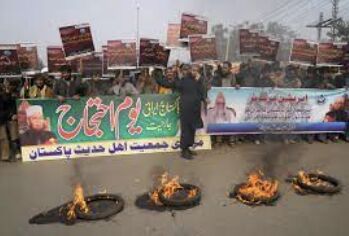De-escalation Diplomacy: Pakistan and Iran Commit to Strengthen Cooperation After Deadly Airstrikes
Pakistan and Iran have agreed to de-escalate tensions after deadly airstrikes and are working to strengthen cooperation in counter-terrorism efforts. The return of ambassadors signals a potential return to normal diplomatic relations.
Pakistan and Iran have agreed to de-escalate tensions following a series of deadly airstrikes on militant targets in each other's territories this week. After a phone call between Pakistan's Foreign Minister Jalil Abbas Jilani and Iran's Foreign Minister Hossein Amir-Abdollahian, the two countries expressed their commitment to strengthen cooperation in counter-terrorism efforts and other mutual concerns.
Pakistan seeks dialogue and normalization with Iran, emphasizing mutual respect and cooperation. #پاکستان_کا_جوابی_وارpic.twitter.com/1h3vu8DhMJ
— Sameen (@whynot_chai) January 18, 2024
The return of ambassadors to their respective capitals was also discussed, signaling a potential return to normal diplomatic relations following these recent hostilities. These on-going hostilities caused Pakistan to recall its ambassador from Tehran and block the return of Iran's envoy to Islamabad. However, after an emergency security meeting with military and intelligence chiefs, Pakistan's caretaker Prime Minister Anwaar-ul-Haq Kakar made it clear that the sovereignty and territorial integrity of Pakistan are non-negotiable. Despite this, he also acknowledged the importance of addressing each other's security concerns for the larger interest of regional peace and stability.
Both countries have emphasized the need for restraint and peaceful means to address any security concerns. Following the attacks, the United Nations and the United States have also appealed for maximum restraint to avoid further escalation of tensions. Of the 11 reported casualties, mostly women and children, there is a fear that further border closures could exacerbate the already impoverished region and lead to a rise in separatist organizations. It has been observed that these recent hostilities mark a rare military engagement in a region with a history of simmering militant movements.
However, analysts have noted that both sides seem to be working toward de-escalation and a return to normal diplomatic relations. This situation serves as a reminder of the importance of dialogue and cooperation in addressing security concerns between neighboring countries.




